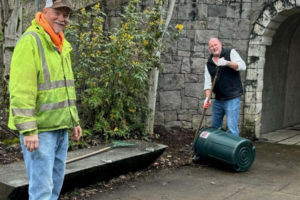Kelly Slauson’s optimistic nature is contagious.
Within a few minutes of meeting her, it’s very plain to see that this 20-year-old college student is most definitely a “glass is half full,” kind of gal.
Slauson balances a lot on her plate. She is pursuing a nursing degree at the University of Portland, working as a nanny and spending time volunteering for local and national non-profit organizations. In the past, her activities have included playing soccer and rowing.
All of these activities and responsibilities alone would be more than enough for any young person to juggle, but factor in the significant and painful health issues she’s had to deal with throughout most of her life, and that genuine sunny outlook she has about the world is even more inspiring.
When she was 18 months old, Slauson was diagnosed with rheumatoid arthritis. It’s a chronic autoimmune disease with symptoms including inflammation of the lining of the joints, which has the potential to cause pain, loss of function and even disability.
“Before I would go down for a nap I’d be walking,” Slauson said, recounting the story she has heard about her life as a toddler. “After I’d get up, I’d be crawling, and then I’d slowly get up and walk with a limp.”




